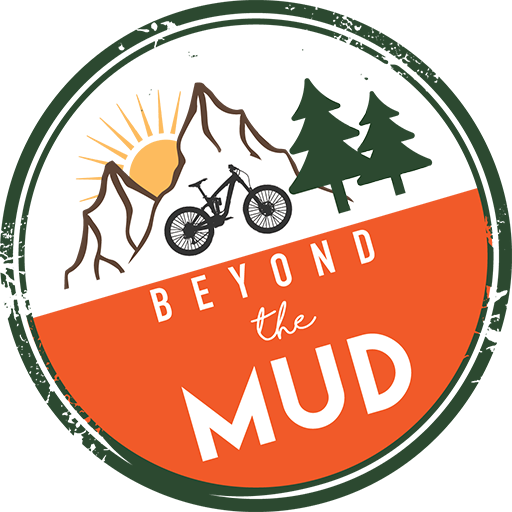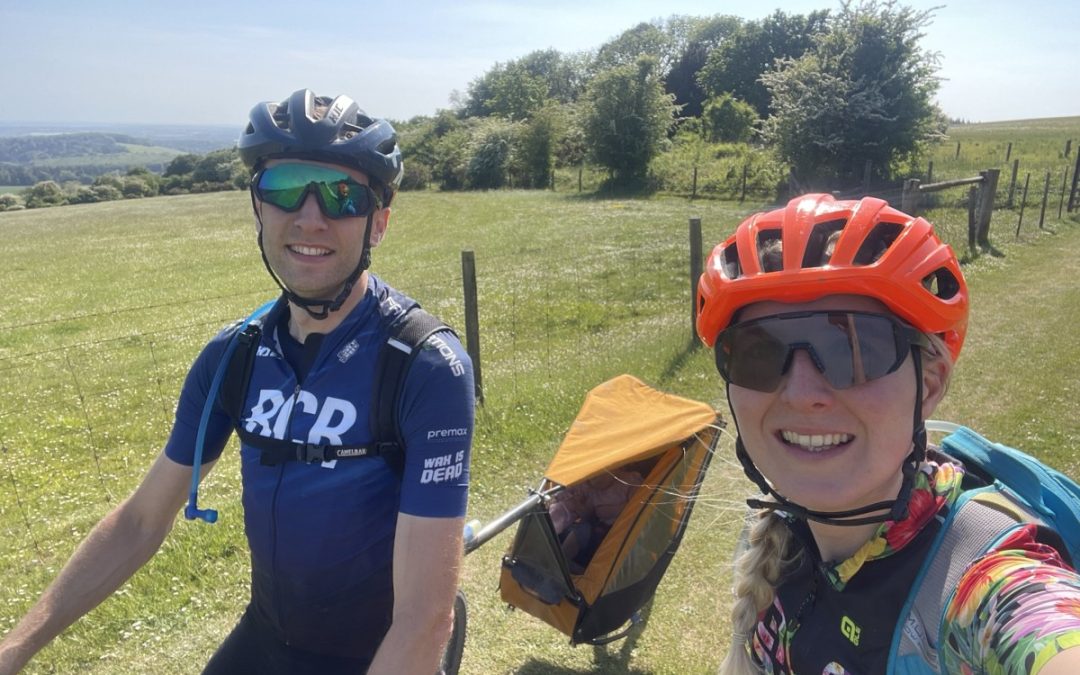
by hattenburrow | Jun 28, 2023 | Adventure, Bike Packing, Biking Adventures
Back in May, seems like a distant memory now! We went bike packing for three days across the South Downs with our then 18 month old toddler, Ffion.
Travelling with a toddler, even in a car, can be a logistical nightmare and game of how much can we really fit in the boot, so on the bikes where space was a premium we really had to think carefully about packing..
We had a practise pack a few days before we went to make sure we could fit what we needed for us and Ffion into the Alp Kit bags we had.
Emyr and I packed sparingly for ourselves knowing Ffion would be the one more likely to need a changes of clothes etc.
Staying in hotels made it slightly easier as we did not have to take tents etc, that is a future trip!

For myself I packed:
- Two bib shorts (wear one wash one)
- Three cycling jerseys
- One pair of shorts for the evening
- Two Tee shirts
- One dress (packs down tiny and doesn’t crease)
- Flip Flops
- Minimal toiletries
- Underwear
- Jumper
- PJ’s
For Ffion we packed:
- One jumper
- Four tee shirts
- Two long sleeved tee shirts
- Two shorts
- One Skirt
- One leggings
- 15 nappies
- One packet of wipes
- Sleeping bag
- 2 vests
- PJ’s
- Sunhat
- Helmet
I carried all mine and Ffion’s clothes in my Alp Kit handle bar bag and the saddle bag, using the flip flops on each side of the saddle bag for more rigidity and to stop it swinging. In the bar mounted bag I also put one of Ffion’s favourite bed time stories this actually worked well as a base to then roll the clothes into the bag!
Once the clothes were packed, I put the suncream in the saddle bag so it was easily accessible.

Entertainment!
Now you are probably wondering how we managed to keep our whirlwind toddler contained to the Tout Terrain bike trailer for those long days in the saddle. The answer is we have a secret stash of toys that we only bring out for such an occasion, so Ffion finds them exciting and interesting.
For this trip we packed:
- 2 hard back mini books
- Busy book with buckles and buttons in it
- Favourite rabbit teddy
- String of beads
- Pretend phone
- Ipad (for evenings)
- Sticker book
All of this plus the nappies, wipes, and Ffion’s food fitted in and around her in the trailer. The Tout Terrain trailer has great side pockets where we could load up entertainment as well as a snack and her drink. Leaving space around her feet for her to wiggle her legs and move her feet.
Each day our riding was planned around Ffion’s schedule taking a long stop during her usual lunchtime for her to eat and run around. We also put in mini breaks for nappy changes and so she could stretch her legs. As well as the entertainment we provided Ffion spent time watching the world go by from the windows in her trailer, we spoke about the trees, the crops in the field, counted squirrels and tried to engage her in her surroundings as much as we could.
What we learnt about the kit we packed.
Clothing, Ffion only wore one long sleeved top and never wore any of the vests I packed, with the weather not being predictable in the UK I think it was worth carrying some items that weren’t used instead of running out of the wrong clothing! She probably would have been fine in her sleeping bag in a vest and we could have left the PJ’s behind as it was super cosy in the places we stayed. I think for a longer trip I would have probably taken some handwash so we could wash a few bits along the way so you don’t have to carry tonnes of outfits.
Nappies, we had just enough! I would probably next time go for 6 nappies a day just incase…
Entertainment, we got this correct Ffion seemed happy with the toys she had over the time. There is an ability to stuff thin items down the back of the seat in the trailer so I think next time I may pop an extra sticker book in and maybe a packet of pastel crayons for the evenings.
Our first bike packing trip with our toddler was very successful, so much so we are hoping to head on a four day trip at the end of August.
But where should we go?

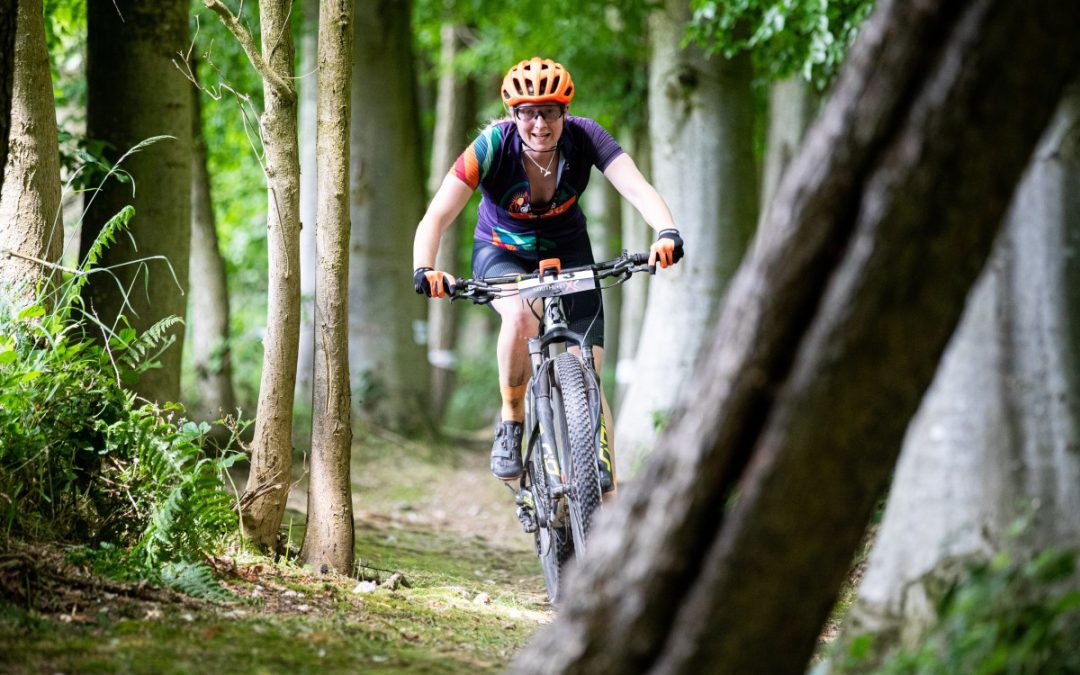
by hattenburrow | Jun 14, 2023 | Mountain Bike Racing
Team effort today to get both Emyr & I to the last round of the Southern XC Series in Basingstoke. Thank you to Granny and Grandpa for taking Ffion on an adventure to the deer park so we could go race.
My second race in 7 years & at least this time there was not a rain drop in sight…. By the end of the race I would have given anything for a drop of rain as the heat sapped the energy from my body! 🥵

I had the usual pre race nerves which I’m never sure I will actually be without even though I try and tell myself it’s just for fun & I’m riding my own race….
Going round the course with Em was fun, like having my own personal tour guide as he pointed out things, he remembered from last year racing at this venue.
Emyr had been talking about how important it was to get into the single track first from the start. So when I was called up I had tunnel vision on getting to that right hand first. After a good wheel spin in the gravel I managed to make my way to the front and into the single track. (must focus on a better start)
I made a stupid mistake at the first climbing picking a crap line ended up with me pushing, not a great start but I got back on reminded myself this was meant to be fun! Going into lap two I forgot to take my gel on the gravel track, another rookie error, so ended up trying to do so on the singletrack!

I felt good & kept pushing trying hard not to look back and ride my own race. After over taking a rider I got my line wrong and completely washed out the front wheel landing hard on my side, after dusting myself off I got back on and finished lap two and three with no more errors. Crossing the line feeling super happy with my achievement and having learnt a lot to take into my next race, whenever that may be….

It was then Emyr’s turn up in the Vets race, a hard category with some rapid riders! Gridded quite low after not attending the last race the dust cloud that arouse as they all sprinted away was spectacular. I spent most of Ems race watching his laps on the live tracking and filling up bottles of water.
Emyr said:
The final round of the @southernxc series at Folly Farm and for the first time this year felt like my legs had returned. A complete contrast in the weather to my last race – just shy of of 30° with dry, dusty and fast trails.

A fast start with limited visibility due to the chalky dust being kicked up with everyone fighting for a decent position into the first single-track section. After quickly settling into a rhythm I began slowly moving up the field. All was going well until disaster struck and my chain broke on the quick link. After struggling to remove what was left of the link it finally gave way but took the end of my thumb with it. Back on the bike I tried catch up with the people I had worked hard to pass. Managed to reclaim a few places to finish in 18th.

Despite the mechanical, had a great day of racing – shame the season is pretty much over. Been great seeing so many familiar faces over the past few months…. until next time👍

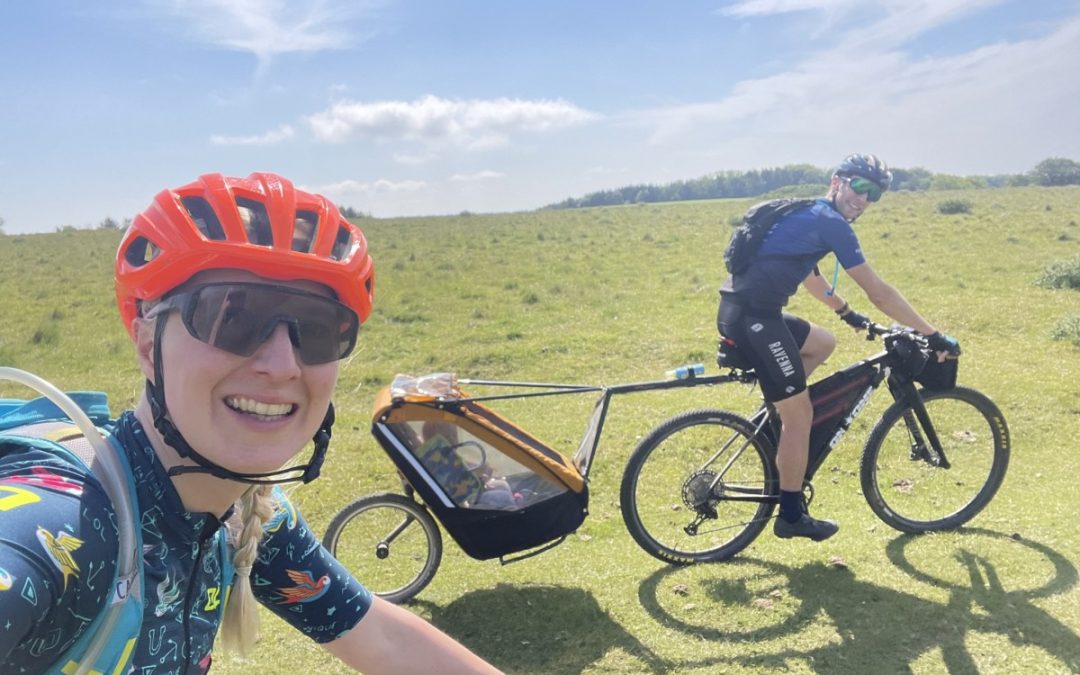
by hattenburrow | Jun 9, 2023 | Adventure, Bike Packing, Biking Adventures
As the early morning sun crept through the skylight, Emyr and I were amazed that Ffion was giving us a lye in this never happens!
Sitting drinking tea we went over our final days route which was mainly made up of bridleways and back roads to get us the 20 odd miles home from Amberley.
Our plan was to pack up and head to the Slindon Forge for breakfast before continuing home. Packing up our Alp Kit bags and loading the bikes for a final time was really sad. I was looking forward to heading home to see Luna but didn’t want our adventure to end!

Rolling out of Amberley and back onto the South Downs Way, back over the bridge and up the road into Houghton Forest, the views out to Brighton were amazing with the offshore wind turbines like little white sticks in the distance.
Meandering through back roads was nice but after a full day off road we were keen for more and headed off road at the earliest opportunity and of course straight into a climb!
This climb took us up all the way to the top of Bignor Hill Road, which is a stunning bridleway way through open fields with far reaching views of the downs and coast in every direction. Both Emyr and I were amazed we were rising somewhere we had never ridden before!

After a thrilling descent to the valley we made it to Slindon Forge for brunch. From Slindon our route was mainly country roads until we reached Lavant.

Climbing out of the valley around the side of Kingley Vale was the final bit of singletrack before we were home.
22 miles covered, 106 miles in three days and 4285 feet of climbing.
Bike Packing South Downs
We have had an absolute blast over the last three days. Bike packing with a toddler certainly brings with it some challenges, like how to take enough nappies, but we had a great time as a family and being able to share this experience with Ffion and show her the South Downs from her bike trailer was epic.
We are already planning the next trip!


by hattenburrow | Jun 7, 2023 | Adventure, Bike Packing, Biking Adventures
Ffion woke at 4:30, after many failed attempts for more sleep, Emyr & I embraced the early morning heading for breakfast just before 7.
Breakfast eaten, bikes packed we rolled out of Winchester not really knowing what the day would bring, hoping to make Amberley, 46 miles away in time for dinner at 6pm. After an exciting morning Ffion was asleep before we left the car park…
Leaving Winchester behind we climbed up Cheesefoot head and then onto Beacon hill, it was slow going mainly because of all the uphill, but there were a few faffing stops too! Going ahead of Emyr down Beacon Hill to get a good shot of him riding down the inevitable happened and he got a puncture. Worm inserted and a quick nappy change and we were back on the road.
We had been planning to go round Old Winchester Hill as the climb up is steep and rutted, however the Meon Valley trail is such a lovely bit of singletrack we decided to give it a go. Old Winchester Hill conquered we continued to Queen Elizabeth Country Park (QE). Looking out over the views from the top of Butser Hill over the rolling hills of the downs I was very impressed with what we had achieved so far, however we still had along way to go!

We stopped at QE for a brief refuel for us & a run around for Ffion leaving QE with our sights set on the Cadence Cafe at Cocking for lunch. As the miles ticked by, we couldn’t believe how amazing our tiny human was being, but a 4:30 wake up and random morning snoozes had really thrown her rhythm and she became a slightly disgruntled toddler as we edged closer to the cafe stop. Luckily Ffion’s favourite thing is running and so on stopping Ffion ran from inside to outside of the cafe for the duration of our visit with both Emyr and I taking a bite of food before trying to heard our little whirlwind. As you can imagine getting back in the trailer was not a popular choice! Thanks to Nanny for the sticker book which saved the day!
Cocking hill was climb 8 of 9 according to the Garmin, which I have to say was deeply wrong. I counted at least 4 if not 5 more climbs before our descent down to Amberley began!! From cocking hill, we continued along the South Downs Way all the way to Amberley, this is a part of the South Downs Way I love, as red kites circled above us, baby lambs jumped around in the fields and cows grazed happily as we rolled by the scenery made all the climbing worth it! With views out to the sea on one side and rolling hills on the other I thought how lucky we were to be able to call this our local riding spot.

After crossing the last busy road we dropped down a super descent into the village of Amberley, the valley was so different from the South Downs Way, flat and we followed the river Arun past reed beds and horses grazing.

Within the last 2 miles I decided to have a quick lay down in the grass, Emyr had told me about a step up onto the bridge but failed to mention the gate, as he stopped for the gate I just happened to be filming and couldn’t film, break and unclip at the same time. My foot decided it liked being in my pedal, refused to unclip sending both bike, phone and I to a soft landing in the grass just moments from the grasp of the River Arun. Which is the second fastest river in the UK (every day is a school day).
Cycling through the pretty village of Amberley to our Air BNB I was really impressed we had made it with 30 minutes to get ready before dinner at the Black Horse a pub I would recommend but maybe leave your toddlers at home!

Well done team what an epic day!
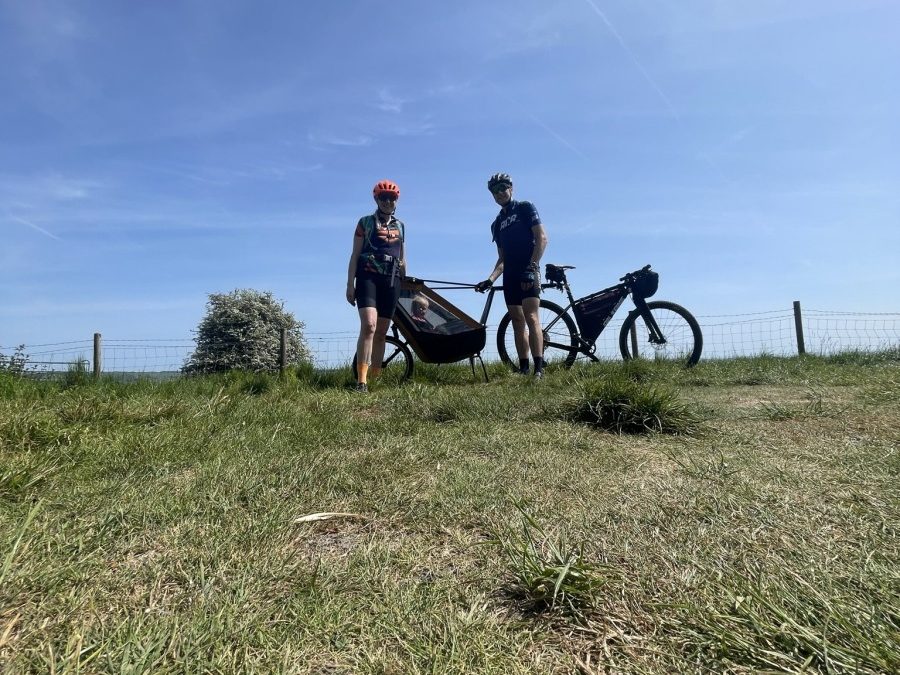
by hattenburrow | Jun 5, 2023 | Adventure, Bike Packing, Biking Adventures
Bike Packing with a Toddler.
After weeks of planning, re planning and more planning it was finally here – the day we would set off on our three-day bike packing adventure with our little girl Ffion. We had no idea how our 19-month-old would cope over three days and had scaled back our original King Alfred Way idea to a triangular route along the South downs. We did this for a few reasons but mainly riding trails we knew and having ‘emergency escape routes’ to get home if we needed made it slightly less daunting!
After two hours packing the Alpkit bags and Ffion’s Tout Terrain trailer we were ready to set off on the first leg. The first day would be biking from home, near Chichester, to Winchester and staying over night in the Premier Inn, mainly because we knew it was bike friendly and easy to get too!
We had never ridden over 20 miles with Ffion in the trailer so took the quicker road route through Rowlands Castle, Charlton and then up to Butser Hill before heading onto the South Downs Way. Ffion slept for most of this leg of the journey, waking just in time for lunch at the Sustainability Centre!

After a delicious lunch we headed onwards and upwards to the top of Old Winchester Hill, one of the real high points with views reaching far out over the Meon valley with rolling hills of crops and sheep.

After lots of open bridleway the Meon Valley trail was a welcome break from the sun as we rolled down through the trees before we re-joined a quiet back road through a few pretty villages and on to Beacon Hill. Back off-road, Ffion was busy playing with her ‘busy book’ (A book full of clasps, buckles, Velcro and zips which gives her endless fun).
The miles clocked up and the time ticked by and soon we were closing in on Cheesefoot Head, the final high point of the day. Open fields stretched for miles interspersed with woodland and down in the valley we could see Winchester, which still seemed quite far away!
We stopped for a snack break and for Ffion to have a run around on the grass, I felt so grateful to be able to share this adventure with her. Snacks packed away it was back to the trail and to continue our final descent into Winchester.

Arriving at the Premier Inn was simple as there is a bridleway which takes you almost to the door. Check in was easy and having the bikes in the room made it much easier.
Now time for that good nights sleep… apparently its guaranteed! What is not guaranteed is being able to get your toddler to sleep in the room where you are staying…
In total we rode 51km in 3 hours 12 minutes with an elevation of 724 meters.





